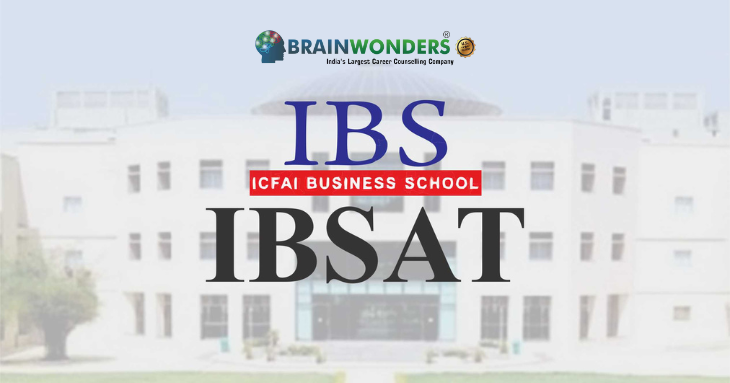

Are you aware which subjects and courses will bring you closer to your dream career?
Worry not, because the Brainwonders test and guidance will not only help you know it, but also follow it!
Blog
18 January,2024 | By Brainwonders

The MBA full form is Master of Business Administration (MBA) and it is an internationally-recognized post-graduate program that provides students with the essential skills to excel in the business and management fields. It equips them with the abilities needed to further their career goals and develop leadership capabilities, providing the opportunity to broaden their professional network while accelerating the advancement of their earned salary potential.
In India, people with an MBA usually make about Rs. 7,71,801 a year. This can change depending on their experience, the type of MBA they did, and where they work. For instance, those with 10 to 19 years of experience might earn around Rs. 1,400,000 yearly. In cities like Gurgaon, Haryana, and Bangalore, the pay is often higher, with salaries averaging Rs. 750,000 and Rs. 730,000. The kind of MBA also plays a role in earnings. For example, someone with an MBA in Finance might earn between Rs. 4,00,000 and Rs. 10,00,000 each year.
The MBA full form is Master of Business Administration (MBA), is a widely acclaimed graduate program with a long and distinguished history. Developed in the United States during the late 19th and early 20th centuries, the MBA was first established to meet the demands of a rapidly industrialising economy.
As businesses expanded in complexity, so too did the need for qualified professionals adept at managing them. The first business schools arose in response, giving rise to a new form of education that has since become one of the most sought-after degrees globally.
Today, hundreds of thousands of students pursue MBA each year, equipping themselves with the skills necessary to excel in various disciplines such as marketing, Finance, human resources, operations, and analytics.
There are various marketing roles you go for such as MBA Digital Marketing, MBA Finance, MBA Pharma etc. An MBA provides a well-rounded education in business theory, practice, and application, preparing graduates to succeed in many fields and industries.
| MBA full form | Master of Business Administration |
| Degree | Masters or Post Graduate |
| Duration | Two years, One year – Know the difference |
| Course types | Full-time MBA, Online MBA, Executive MBA, and Part-time MBA |
| Specialisations | Finance, Marketing, Operations, Human Resource Management, Consulting, Business Analytics, Entrepreneurship, Supply Chain Management, Energy, and Technology |
| Average MBA Starting Salary | India – INR 8,00,000, USA – Above $90,000, UK – £54,000, Canada – CAD 83,000, Australia – AU$103,000. |
| MBA Cost at Top Business Schools (Average) | $91,687 – $237,636 |
| Popular Entrance Exams | GMAT, GRE, and CAT |
| Top Business Schools in India | Some of the top MBA colleges in India are IIM Ahmedabad, IIM Bangalore, IIM Calcutta, XLRI Jamshedpur, ISB, SPJIMR Mumbai, IIM Lucknow |
| Top Business Schools in the USA | Some of the top business schools in the USA are Harvard, Stanford, Columbia, MIT Sloan, Wharton School of Business, Duke Fuqua, Michigan Ross, Cornell University-Johnson, UCLA Anderson, USC Marshall, UT Austin McCombs, Carnegie Mellon Tepper, and UNC Kenan-Flagler |
| Top Business Schools in Europe | Some of the top business schools in Europe are INSEAD, London Business Schools, Cambridge Judge, HEC Paris, Oxford, and IMD |
| Top Business Schools in Australia | Some of the top MBA colleges in Australia are Melbourne Business School, Australia Graduate School of Management, Monash Business School, and MGSM Macquarie |
| Top Business Schools in Canada | Some of the best business schools in Canada are Rotman School of Management, McGill Desautels, Schulich School of Business, Ivy Business School, HEC Montreal |
| M7 Business Schools | Harvard Business School, Columbia Business School, Wharton School of Business, Kellogg School of Management, MIT Sloan, Chicago Booth, and Stanford GSB. |
| Ivy League Schools – MBA | Harvard Business School, Columbia Business School, Johnson College of Business, Wharton School of Business, Yale SoM, and Dartmouth Tuck. |
As the job market becomes more competitive, having more education can help you stand out. An MBA from a top college equips you with the skills and knowledge to lead, solve complex problems, and keep up with industry changes. Earning an MBA offers many benefits. It can increase your earning potential and provide expertise in specific business fields. You'll learn how to manage teams, address challenges, and make sound decisions. The program also covers the latest trends and technologies in various industries, making you more attractive to employers. Overall, pursuing an MBA is a smart move for career advancement.
Look for schools that fit your career goals, offer the programs you're interested in, and are in a location that works for you. Most schools want GMAT or GRE scores, though some don't require them. If you're from another country, you might also need to provide TOEFL or IELTS scores. Fill out the application with your personal info, academic history, and work experience. Include essays, your resume, and 1 to 3 recommendation letters. If you're shortlisted, you'll have an interview. Once accepted, confirm your spot, apply for financial aid or scholarships, and join any pre-MBA events offered.
In India, the MBA application deadlines for 2025 will vary by institution, but here is a general outline for some of the top business schools and their typical deadlines:
For Example: Indian Institutes of Management (IIM)
In India, an MBA graduate usually earns around Rs. 7,71,801 per year, though this can vary depending on experience, specialization, and location. For those with 10 to 19 years of experience, the salary might reach Rs. 1,400,000 annually. Gurgaon, Haryana, and Bangalore are among the top cities for high MBA salaries, with averages of Rs. 750,000 and Rs. 730,000, respectively. The area you choose to specialize in during your MBA can significantly affect your salary. For example, a Finance specialization may result in earnings between Rs. 4,00,000 and Rs. 10,00,000 per year. Other fields like Business Analytics, Marketing, and Operations Management also provide competitive pay. Keep in mind, these salary estimates can vary based on individual circumstances and current market conditions.
Since MBA colleges are competitive and highly sought after, certain factors influence the earning potential of those who have obtained their MBA degrees. These include experience level, industry sector, location, and school reputation.
Experience level is one of the biggest factors when it comes to salary. The more experience a person has, the more likely they are to land higher-paying jobs and positions. The industry sector also plays a role; salaries vary significantly depending on the individual's field. Your entrance exam score also matters when it comes to your Salary. So, make sure you get a good score in GMAT and CAT if you want to get that top package.
Location is another important factor, as salaries tend to vary across different locations. Finally, the reputation of the college or university where the individual earned their MBA can be a key factor in determining overall salary.
| Careers | Average Salary |
| Financial Analyst | ₹40,000-60,000 |
| Financial Manager | ₹35,000-40,000 |
| Personal Financial Advisor | ₹20,000-37,000 |
| Financial Service Manager | ₹20,000-60,000 |
| Training & Development Manager | ₹25,000-40,000 |
MBA colleges often require prospective students to take MBA Entrance exams such as the Graduate Management Admission Test (GMAT) or Common Admission Test (CAT).
While both exams are designed to assess a student's aptitude for certain areas of business, they differ in structure and content. GMAT focuses on quantitative reasoning and verbal skills, while CAT centres more on verbal and logical ability.
There is also the Graduate Record Examination (GRE), which has become increasingly accepted by MBA colleges in recent years. Depending on the program you wish to pursue, one exam may be more advantageous than the other.
If your goal is an MBA, then the GMAT is likely the better choice; however, if you are unsure if an MBA career is a desired field of study, the GRE could be a more efficient option.
The core curriculum for the MBA typically includes topics such as managerial economics, accounting, finance, marketing, operations management, strategic planning, organizational behavior, information systems and decision-making.
MBA admissions generally requires a bachelor's degree or equivalent qualification is required for admission. Entrance exams such as the GMAT, GRE, and CAT are also requirements for admission. Students need to score marks in their respective MBA exams in order to get into some of the good MBA colleges for admission.
Applicants will be asked to provide MBA entrance exam scores, letters of recommendation, essays, and resumes and pass an interview. Finally, applicants must also take an English proficiency test such as the TOEFL or IELTS. So, the following are the MBA eligibility criteria to get admission to top colleges.
MBA colleges are designed to provide students with comprehensive training in business management, enabling them to take on leadership roles in the workplace.
MBA graduates are designed to have many professional aspirations, making it a valuable and rewarding degree. MBA courses can provide you with the skills and knowledge needed for a successful career in business.
Getting an MBA admission in Technology provides essential knowledge on software development, programming languages, networks, and more. MBA in Supply Chain Management focuses on procurement, transportation, and logistics.
For those seeking a Master of Business Administration, there are many top-tier destinations to consider. The United States (USA) United Kingdom (UK) Australia Canada Singapore India These countries offer world-class educational infrastructure, industry-leading facilities, and access to leading firms and organisations. For these reasons, they are more popular than other destinations for an MBA program.
India is an ideal destination for MBA aspirants, boasting some of the best business schools in the world. Many of these institutions are located in metropolitan and urban centres, providing access to prominent business and industrial hubs. Such resources make these cities advantageous locations for pursuing an MBA.
Aspiring students who pursue their studies at these institutions can benefit from the wealth of information and connections available in these areas. Moreover, the vibrant nature of these cities provides prospective students with a stimulating environment for developing their professional skills.
Delhi is the ideal destination for anyone looking to pursue an MBA. With easy access to bustling corporate hubs in Noida and Gurugram, the city offers students a wealth of career opportunities for professional development.
Among the prestigious business schools in Delhi and the National Capital Region are:
Mumbai, India, is one of the main areas for MBA aspirants due to its access to world-renowned organisations. This is why numerous exceptional business schools have been established in Mumbai.
Below are some of the prestigious establishments based in the city:
These premier institutions offer outstanding educational opportunities and resources, allowing students to understand the business sector comprehensively.
The Ivy League is a prestigious group of eight universities in the United States. Six of these universities offer full-time MBA programs for students to pursue. Columbia Business School Johnson College of Business Wharton Business School Harvard Business School Yale SoM Dartmouth Tuck. Those wishing to further their business education may benefit from applying to one of these esteemed institutions.
To get the latest MBA information, you can visit the respective websites of the colleges that you are interested in to know more about it.
Are you unsure about choosing the right course for yourself? Our Brainwonders counselling team is here to help. We will provide you with personalised guidance to ensure that you make an informed decision about your future.Our Brainwonders Career Counselling Experts can help you find the best fit for your educational goals. Together, we can explore all the possible options and create a plan that will lead you to success.
Q1. What is MBA full form?
Ans: The Master of Business Administration (MBA) is a globally recognized post-graduate program that provides individuals with the skills and knowledge necessary to enter into careers in business and management. Through the MBA, students understand core business principles such as accounting, Finance, marketing, operations, and strategy, while gaining additional insights into leadership development, decision-making, and problem-solving.
Q2. Why to study MBA in 2024?
Ans: From increased salary potential to improved career prospects, MBA students have access to a wide array of resources designed to take their career goals to the next level. With an impressive network of alumni and faculty from top universities, an MBA degree provides unparalleled opportunities for success.
Q3. What is the full form of an MBA?
Ans: The full form of an MBA is a Master of Business Administration.
Q4. What is the duration of a typical MBA?
Ans: Two years
Q5. Do Indian MBA colleges accept GMAT?
Ans: Many MBA colleges offer full-time MBA programs for domestic students that accept the GMAT exam. International students, however, must take the GMAT to apply. Additionally, the GMAT is the preferred test for executive and one-year MBA programs.
Q6. What are the career options after MBA?
Ans: Potential career paths include executive leadership positions such as CEO, CFO or COO; positions at Fortune 500 companies; entrepreneurship opportunities; and consulting roles. Additionally, MBA graduates can pursue positions in marketing, operations, finance and human resources.
Q.7. What are some MBA specializations?
Ans: Some of the most popular MBA specializations within the MBA are Finance, Operations Management, Human Resources, Marketing, Entrepreneurship, and International Business. Finance specializations provide insights into portfolio management, investments, financial risk analysis, and other topics related to how businesses operate and manage money. Operations Management allows students to learn the principles of lean manufacturing, supply chain management, business process improvement, and other core business processes.
Q.8. What are some top private MBA colleges?
Ans: 1) XLRI Xavier School of Management
2) Management Development Institute
3) Symbiosis Institute of Business Management
Q.9. What are some top government MBA colleges?
Ans: 1) IIM Ahmedabad
2) IIM Lucknow
3) IIM Calcutta
4) IIM Bangalore
Q.10. Is a Distance education MBA worth it?
Ans: Yes, a Distance MBA is worth it if you want to know about how a profitable business is set up and want to know more business aspects, and as for career opportunities, there are some companies that accept distance MBA's, although the salary won't be as high as given to full-time MBA students.
Q.11. What is the MBA fee structure and MBA cutoff?
Ans: The fees for MBA can range from 3 lakhs to 28 lakhs in India. MBA cut off for top colleges is around 700 to 740 in GMAT.
Worry not, because the Brainwonders test and guidance will not only help you know it, but also follow it!



,_Syllabus,_Pattern,_Old_Question_Papers.png)

